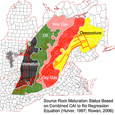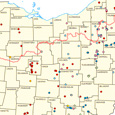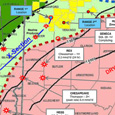Gold rush: Marcellus Shale drilling brings business to town
Tuesday, June 7, 2011
UNIVERSITY PARK, Pa. — A survey of businesses in two Pennsylvania counties where natural gas drilling is occurring suggests that the Marcellus Shale boom is having a positive net effect on business activity.
“The Marcellus Shale gas boom clearly has the potential to affect local businesses across Pennsylvania,” said Timothy Kelsey, professor of agricultural economics in Penn State’s College of Agricultural Sciences
The survey results provide insights into what occurred in two of Pennsylvania’s most active Marcellus Shale counties — Bradford and Washington — during 2010 and what other counties could experience as drilling activity increases.
“The types of businesses responding generally were consistent with the actual business composition of each county’s economy, making the survey fairly representative of actual conditions,” Kelsey said.
Basic differences
Kelsey noted that differences in Marcellus-related sales and employment trends in the two counties likely were due mostly to the relative size of their populations and economies. Bradford County is largely rural with a population of about 60,000, while Washington County is much more urbanized and is home to more than 200,000 residents.
“The results suggest that the size of the host county is an important factor affecting the scope and visibility of impacts on businesses due to natural-gas drilling,” he said.
“The relative impacts likely will be greater in smaller counties, but this also means greater risk of a ‘bust’ when drilling activity slows.”
The survey also showed that changes in business activity differed across business types. For instance, 80 percent of hotels and campgrounds in Bradford County reported changes due to gas-drilling activity, and 100 percent reported higher sales.
Higher sales also were reported by half of that county’s financial businesses, 44 percent of retailers, 38 percent of eating and drinking establishments, and 33 percent of wholesale trade and business services firms.
Tourists still coming
Despite concerns about the possible negative effects of Marcellus gas drilling on tourism, tour operators, souvenir stores, tourist attractions and other tourism-related businesses did not appear to be affected.
Twenty-nine percent of such businesses reported increased sales due to natural-gas drilling activity, while 71 percent reported no change. None reported difficulties in finding or retaining employees.
“However, the long-term impact on tourism still is unknown, since additional new well pads, pipelines and access roads have the potential to change communities enough to affect tourism,” Kelsey said.
Too early to tell
Kelsey cautioned that the survey offers just a snapshot, taken very early in the long-term development of the Marcellus Shale.
“The impacts on businesses may change over time due to the cumulative effects of drilling,” he said.
The economist said it’s also important to note that higher local business sales do not directly affect local tax collections by counties or most municipalities and school districts.




